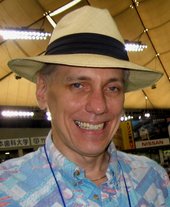
THE HOT CORNER: Few reasons for hope in Yokohama

THE HOT CORNER: Few reasons for hope in Yokohama
by Jim Allen (Dec 17, 2009)
After years of horrible results, the Yokohama BayStars are shaking things up in hopes of getting back in some pennant races. Other than a third-place finish in 2005, the club hasn't been within sight of a pennant race since dumping manager Hiroshi Gondo following the 2000 season.
The BayStars canned interim skipper Tomio Tashiro at the end of this past season and replaced him with Takao Obana, a veteran pitching coach who has overseen impressive pitching development with four different teams.
There is no reason to think Obana can't do the job, and a flurry of offseason activity indicates the BayStars are more serious than ever about upgrading from their current status as the Central League's bargain-basement doormats.
Because successful pitching depends on many factors, a pitching coach has little or no influence over, it's hard to say how much credit Obana deserves for his pitchers' improvement in the past.
He coached two years for the Chiba Lotte Marines starting in 1995 and two more years for the Yakult Swallows before moving to Fukouka to work with the Hawks.
Fukuoka Daiei was just beginning a massive buildup of pitching talent when Obana joined the club in 1999--the year the Hawks won their first Japan Series in Kyushu. Obana coached there until leaving for the Yomiuri Giants in 2006.
In each case, his staffs had better ERAs in his tenure than in the three years prior to his arrival. The Marines' team ERA dropped from 4.13 to 3.48, the Swallows' from 3.89 to 3.47, the Hawks' from 4.10 to 4. 00 and the Giants' swooped from 4.58 all the way down to 3.38.
Another measure, Bill James' Win Shares, estimates Obana's staffs were 30 percent better than the ones he inherited.
Thus it will be a shock if the BayStars pitching fails to significantly improve in 2010. Of course, Obana takes over more than just the pitchers.
He comes into an organization with a documented learning disability when it comes to its home park. Since the club moved to Yokohama from Kawasaki in 1978, its biggest handicap has been misunderstanding how Yokohama Stadium affects play and skews offensive and defensive numbers.
Quitting cramped Kawasaki Stadium in favor of a larger park with towering outfield walls, the Taiyo organization shifted toward speed and defense. It became an obsession after the media latched on to the exploits of the Whales' "Super Car Trio" of Yutaka Takagi, Kaname Yashiki and Hirokazu Kato.
Taiyo bought into the then-popular idea that a speedy team playing on carpet could run its way to a pennant. While the speed made Yokohama's games interesting, the club paid less and less attention to whether a player could drive the ball or reach base.
Yokohama Stadium boosts batting averages, and the gradual shift toward larger parks around the league has made it a relatively good home run park as well.
Because runs come easy in Yokohama, the 'Stars team ERAs would be higher than average even if their pitching quality was average. But the organization habitually looks at the numbers and sees pitching as the principle handicap and offense as its strength.
The pitching was atrocious in 2008 and well below average in 2009, but Yokohama's offense last season was one of Japan's worst in 10 years. The BayStars were 12th in runs scored despite playing in Japan's best hitters' park.
There are big issues, but also some room for optimism.
Second baseman Kazuya Fujita might be one of Japan's best-fielding second basemen but hasn't shown he can hit. New acquisition Daisuke Hayakawa is a very good outfielder who can fly and has hit in the past.
Free agent catcher Tasuku Hashimoto is a left-handed hitter with a sweet swing and is very good behind the plate. The only knock on him is a history of injuries.
Hayakawa, Hashimoto and right-hander Naoyuki Shimizu all came over from the Marines and could easily make an impact on the other side of the bay.
This club has plenty of issues, but at least the BayStars are making a genuine effort to address them. It should make them a more interesting team to watch in 2010.
To access the original work (if still available), please reference:
http://www.yomiuri.co.jp/dy/sports/20091217TDY20303.htm.
Back to the works of Jim Allen
This work is licensed under a Creative Commons License.
Some rights reserved.
